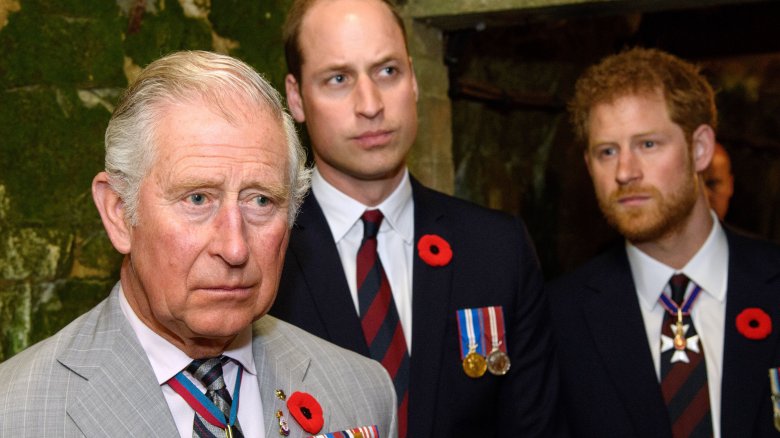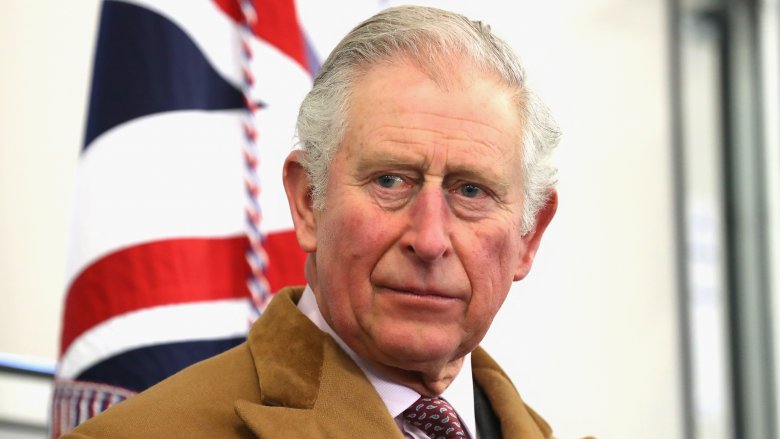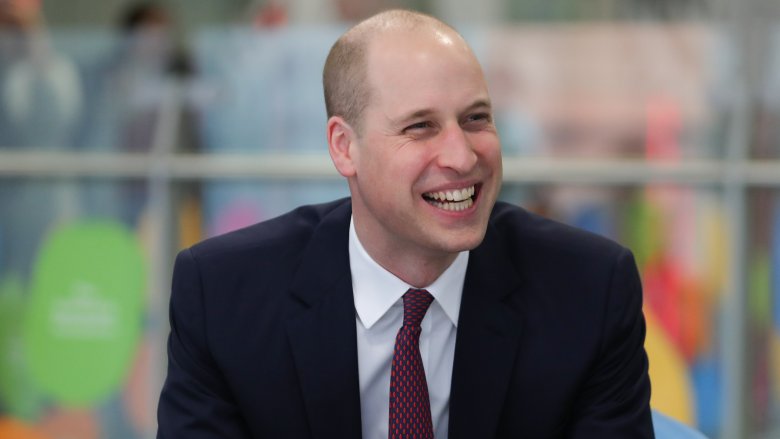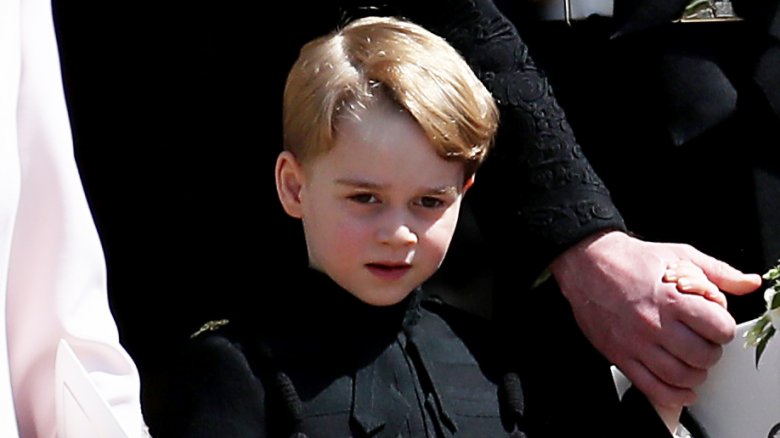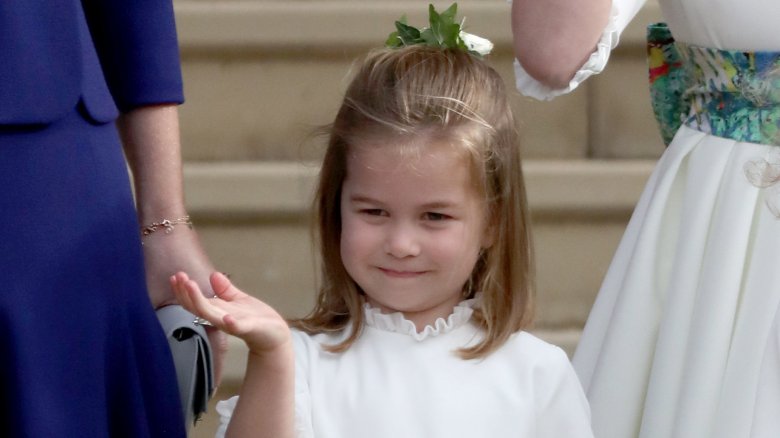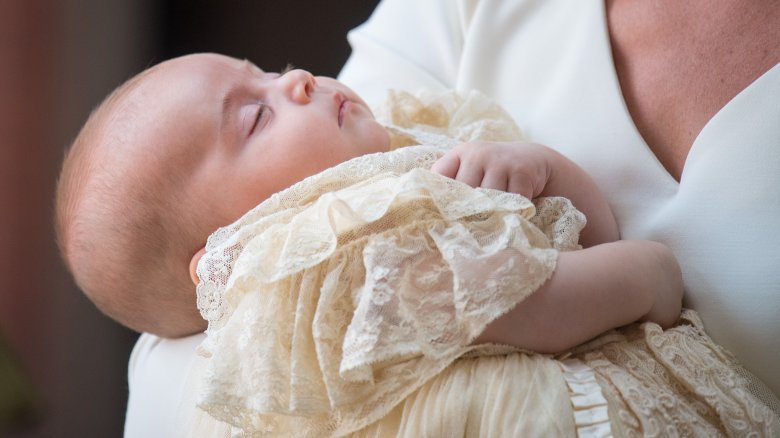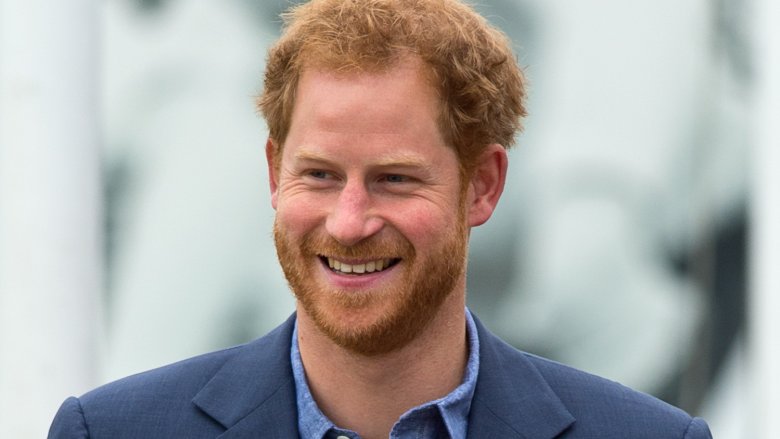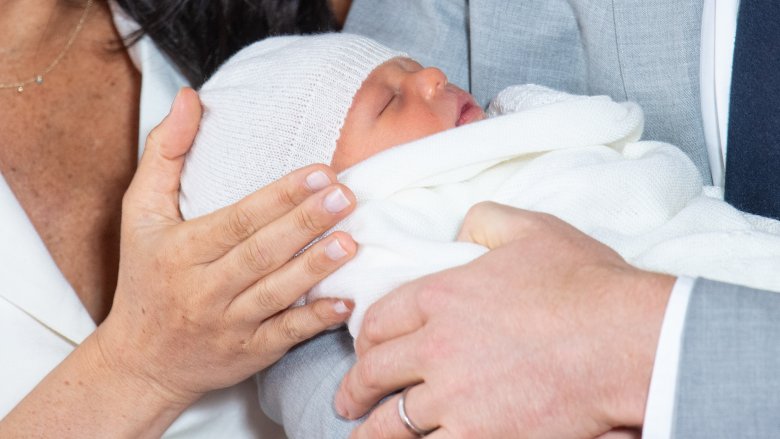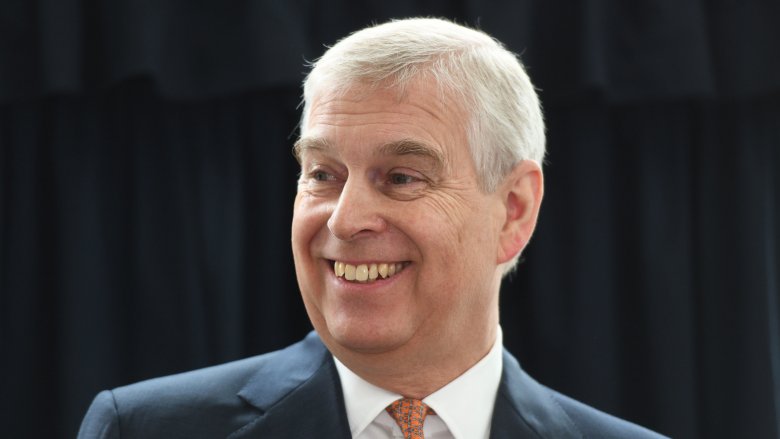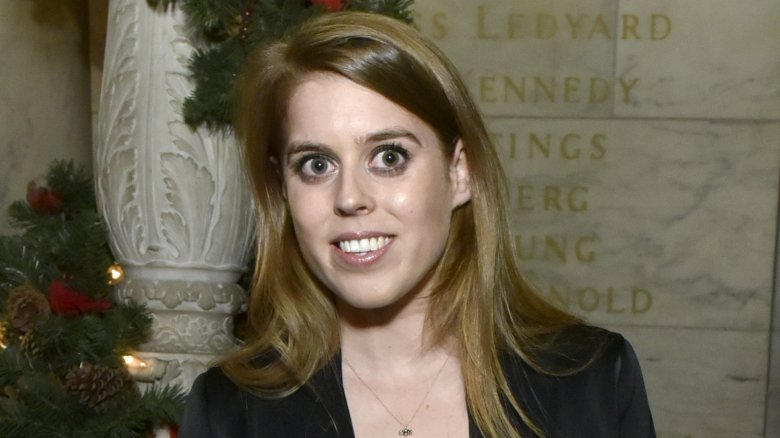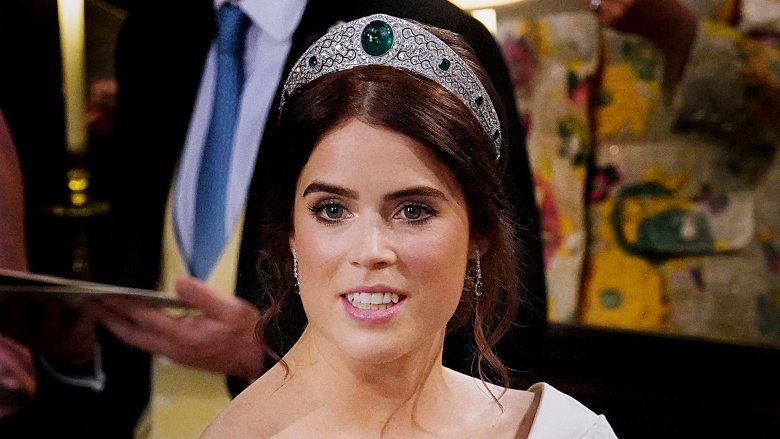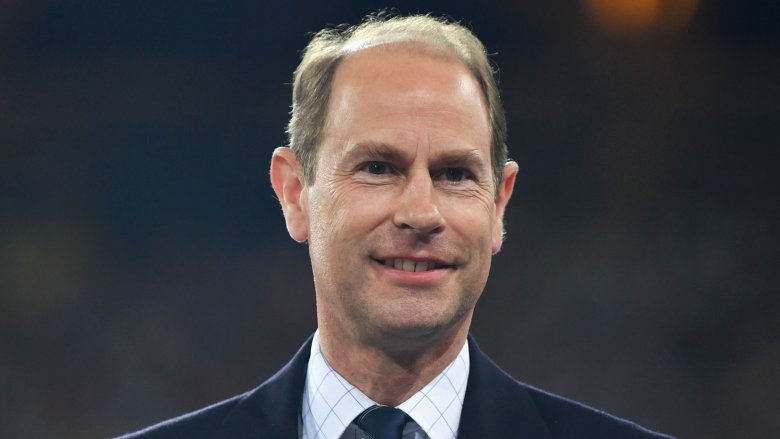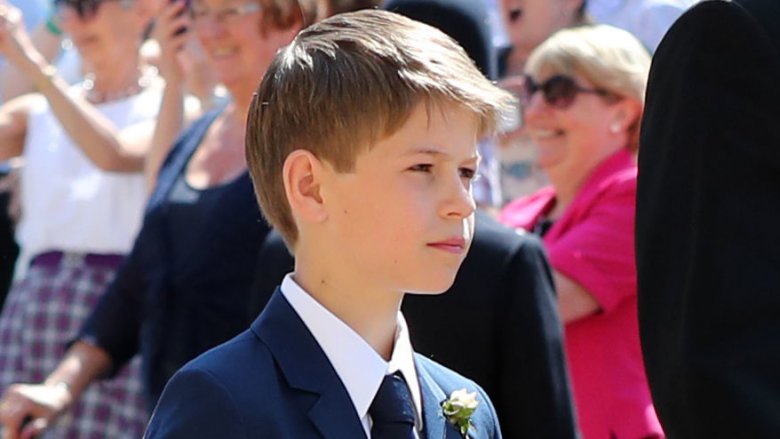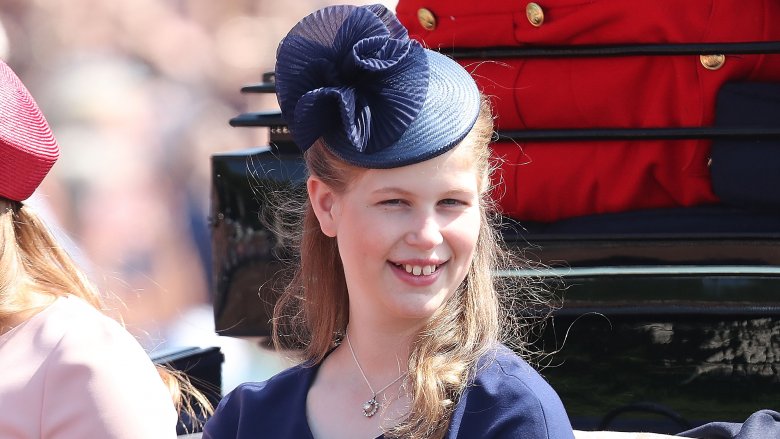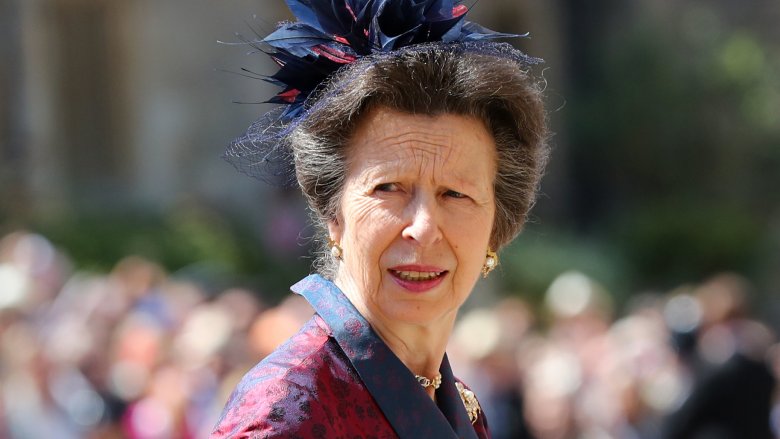How Far The Royals Are From The Throne
When royals Prince Harry and Meghan Markle welcomed their son, Archie Harrison Mountbatten-Windsor, to the world, there was a lot of talk about his chances of one day becoming king. Upon his birth, he wasn't named a prince or even given a royal title, but he did successfully bump some royal relatives further away from the throne. By simply being born, he changed the line of succession. Of course, that raises the question: what even is this line of succession?
Enacted in the late 1600s, the line of succession is quite literally, according to the royal family's official website, "the sequence of members of the Royal Family in the order in which they stand in line to the throne." However, it's not solely about birth order. Parliament also has a say in who gets to sit on the throne. As such, "a Sovereign can be deprived of his/her title through misgovernment." Still, being of royal descent is a requirement — which is why Meghan and her sister-in-law Kate Middleton have never been in the running. So, who is? Allow us to explain.
Prince Charles
In 2016, Queen Elizabeth II officially became the longest-reigning living monarch. That's quite the accomplishment. On April 21, 2019, the queen celebrated her 93rd birthday and, as of this writing, is showing no signs of slowing down. That's not to say she hasn't been weighing her options though.
"One senior aide told me that the Queen has given the matter of her passing years considerable thought and believes that, if she is still alive at ninety-five, she will consider passing the reign to Charles," royal expert Robert Jobson wrote in his book Charles at Seventy: Thoughts, Hopes and Dreams (via Reader's Digest). He continued, writing, "Abdication, however, is not even a consideration."
According to the expert, the Regency Act enables the queen to name Charles Prince Regent. At that point, he could take over his mother's official royal duties without her having to give up her crown. After Queen Elizabeth's death, though, Charles will indeed become king — which makes him the first in the line of succession.
Prince William
While Charles is the first rightful heir to the throne, not everyone wants to see him become king. According to Express, a 2019 survey revealed that 46 percent of Brits want Charles to abdicate the throne upon being named sovereign so that the next in line, his son Prince William, can take over. However, the experts don't foresee this happening. "I certainly don't think [Charles is] preparing to hand over to William or to abdicate himself," royal biographer Penny Junor told Express. "I think he will become King." An additional 27 percent surveyed revealed they'd be content if Charles was skipped over entirely — with William taking over as soon as Queen Elizabeth II passes. But that's not actually possible.
As royal expert Ingrid Seward explained to People, "The Queen herself doesn't have the power to make those sort of decisions." The Act of Settlement of 1701 dictates that the crown would go to the monarch's first direct heir. In this case, Charles. Unless Charles dies before his mother, William will likely not be the next to rule. Instead, as the second in the line of succession, he will rule after his father's reign.
Prince George
On July 22, 2013, Prince William and Kate Middleton welcomed their first child, George Alexander Louis. Upon his birth, the young prince became the third in the line of succession. His birth was also monumental for another reason. As his biography states, Prince George's birth marks "the first time since the reign of Queen Victoria that three generations of direct heirs are alive at the same time."
After his father's reign, George would then have his turn to rule. It's a grim thought, but if William either dies or abdicates the throne while the prince is still a child, George would still instantly become monarch. But he wouldn't be making any major decisions. This is another situation in which the Regency Act could come into play. The act enables a sovereign under the age of 18 to attain his title while the next adult heir serves as regent. Pending any other tragic circumstances, this would be his uncle, Prince Harry.
Princess Charlotte
Just two years prior to Princess Charlotte's birth, Queen Elizabeth II enacted the Succession to the Crown Act of 2013. And it was a monumental change. The act states that "the gender of a person born after 28 October 2011 does not give that person, or that person's descendants, precedence over any other person (whenever born)." This meant that when Charlotte came along in 2015, her place — fourth in the line of succession — would remain fixed even if her parents went on to have a son after her. This act also did away with the 18th century act that disqualified royals from ruling if they were to marry someone of the Roman Catholic faith.
In a statement provided to the BBC, Deputy Prime Minister Nick Clegg wrote, "The act reflects this Government's emphasis on equality by removing centuries of discrimination on both religious and gender grounds." He continued, writing, "The act puts in place succession laws that are fit for the 21st century and for a modern constitutional monarchy."
Prince Louis
It was a good thing Queen Elizabeth II enacted the Succession to the Crown Act because, in April 2018, William and Kate welcomed their third child — a son —Prince Louis. Without the act, Charlotte would've been bumped down the line of succession upon her younger brother's birth. Instead, Louis assumed his position as fifth in the line of succession.
While it's possible that Louis could one day become king, the odds aren't great at number five — and that's even if siblings George and Charlotte don't have children. If they do, Louis' chance of ruling becomes even slimmer. If either his older brother or sister goes on to have children, Louis will find himself bumped further down the line of succession.
This also creates an interesting sibling dynamic because he will likely see big brother George take the throne. As of summer 2018, though, George had yet to find out that he was "different" than his little sister and brother. "With George they are trying to delay that moment of realization and give him normality before they thrust this on him," royal biographer Catherine Mayer told E! News (via Harper's Bazaar).
Prince Harry
Prince Harry knows what its like to be continually bumped away from the throne. Just as George and Charlotte's potential future children will bump Louis down in the line of succession, Harry's nephews and niece did the same to him. Prior to the births of his brother's three children, the Duke of Sussex was third from the throne. Had William and Kate not had children, there would've actually been a fairly decent chance that he'd one day rule. These days though, it's very unlikely. Upon Louis' birth, Harry became the sixth in the line of succession.
However, Latin Times highlighted the five ways Harry could conceivably become king. But keep in mind that these are all highly unlikely scenarios. Harry would become the go-to guy if: the five heirs die before Harry; the five heirs become "incapable" of ruling; William abdicates the throne and abdicates on behalf of his children; William and his kids denounce their Protestant Anglican faith and convert to Catholicism; or, lastly, William's kids all decide to marry without seeking the permission of the ruling sovereign. So, basically, don't hold your breath.
Master Archie
While the odds aren't looking good for Harry to become king, they're even slimmer for his son, Archie. In fact, Archie is so far down in the line of succession — seventh — that he wasn't automatically entitled to receive a royal title. This is why he's not Prince Archie. Still, it was thought that Meghan and Harry would choose some form of royal title. Ahead of Archie's birth, royal expert Victoria Arbiter speculated to Global News that he might be given the title of "Earl of Dumbarton, one of Harry's subsidiary titles." Instead, his parents seem to have elected to use no such title. Royal expert Rebecca English confirmed on Twitter that Archie will simply be known as "Master Archie."
Although Archie was born without a title, he stands to inherit one after his grandfather Prince Charles becomes king. Arbiter revealed that Archie, who would no longer be seventh in line at that point in time but sixth, would become His Royal Highness Prince Archie.
Prince Andrew
In recent years, most haven't heard too much about Prince Andrew. But that wasn't always the case. Prior to the births of William and Kate's three children and Harry and Meghan's son, Andrew was fourth in the line of succession and the scrutiny on his lifestyle was harsh. Though the scrutiny was perhaps warranted.
In 2011, Vanity Fair detailed the ways in which the royal family was attempting to "handle Prince Andrew" due to "the prince's dissolute lifestyle, links to unsavory foreign potentates, and friendship with the American registered sex offender Jeffrey Epstein." Eek. His divorce from Sarah Ferguson in the mid-'90s was also considered a scandal at the time.
Even before all of these things would take place though, Andrew had earned a bit of a reputation for being spoiled by his mother, the queen. "Whenever she hears that Andrew is in Buckingham Palace, she'll send him a handwritten note, and he always goes to see her," a former Palace aide revealed to the Daily Mail (via Vanity Fair). "Believe me, he can do no wrong." Some may be relieved to know that Andrew is no longer fourth but instead eighth in the line of succession.
Princess Beatrice
Although Andrew may not be the public's favorite royal, there's no denying how much we all love his daughters, Princesses Beatrice and Eugenie. Although Andrew and Sarah Ferguson's oldest daughter, Beatrice, is ninth in the line of succession, she's not technically a "working royal," which, according to James Brookes, the director of broadcasting and communications at Royal Central, means they don't "carry out engagements on behalf of the Queen." As such, Beatrice is not entitled to an income from the royal family via the Sovereign Grant.
Beatrice may not be a "working royal," but she does work. As of this writing, she is the vice president of partnerships and strategy at Afinti, an analytics company. Prior to working for the company, she was an associate at a private equity firm, a business development associate at Sony, and a research analyst at a private wealth firm. While it does seem likely that she inherited a trust fund from her parents' divorce settlement, she's obviously career-minded.
Princess Eugenie
A year and seven months after Princess Beatrice was born, Andrew and Sarah Ferguson welcomed another daughter and princess, Eugenie. Like her sister, Eugenie is not entitled to receive an income from the royal family because she is not a "working royal."
Although you won't find her performing royal engagements, we're all still pretty invested in the princess' life. After she and her longtime boyfriend Jack Brooksbank got engaged, we started looking forward to the royal wedding. Held in October 2018, Eugenie married her groom at Windsor Castle — where Meghan and Harry had married five months prior.
Being tenth in the line of succession — and not being a "working royal" — has enabled Eugenie to pursue a career of her choosing. As was revealed in a profile of Eugenie for Harper's Bazaar, the princess works as an associate director at the Hauser & Wirth art gallery — and it's a career she thoroughly enjoys. "I love being able to share my passion for art with people," she told the publication. "If someone doesn't understand something, you have the ability to suggest, 'Maybe you can look at it this way.' That's what I find most thrilling about working in a gallery."
Prince Edward
Prince Edward lives a relatively quiet life for being not only royalty, but the son of Queen Elizabeth II herself. The queen appears to have a particular fondness for the youngest of her children — and body language experts agree. "Her body language is screaming, 'that's my baby!,'" Susan Constantine, human behavioral expert and author of The Complete Idiot's Guide to Reading Body Language, revealed in an interview with Good Housekeeping.
However, being the Queen's favorite son doesn't make Edward any closer to the throne. At 11th in the line of succession, there's little to no chance that he will ever come to rule — especially given his age. In March 2019, the prince celebrated his 55th birthday. But he did earn a new title on that day. The royal family's official site revealed that Queen Elizabeth gifted him another earldom and he thus became the Earl of Forfar, in addition to already being the Earl of Wessex.
Viscount Severn James
In 2007, Edward's wife, Sophie, gave birth to the couple's second child, a son. The prince told the BBC that the experience was "a lot calmer than last time" and commented on how "very cute and very cuddly" his newborn son was. Born James Alexander Philip Theo Mountbatten-Windsor, the young royal was given the courtesy title of Viscount Severn and, as of this writing, is 12th in the line of succession.
You may not be all that familiar with this young royal, but you have probably spotted him in pictures of Princess Eugenie's wedding. Still, you likely won't see James very often. In an interview (via Daily Mail), his mom spoke about shielding her children from the limelight. "Certainly when they were very young we tried to keep them out of it," she explained. "Only because for their sakes, to grow up as normally as possible we felt was quite important." She continued, saying that her kids will "have to go out and get a job and earn a living later on in life" and she's hopeful that a "normal start" will pay off.
Lady Louise Windsor
Four years before James' birth, Edward and Sophie welcomed their first child, daughter Lady Louise Windsor. Are you wondering why it is that Louise is 13th in the line of succession whereas her little brother, James, is 12th? Here's the deal. Before the Succession to the Crown Act of 2013 was introduced, this was the way things had always been in the royal family. For centuries, being male usurped birth order.
With the new act, the crown was no longer dependent on sex. Enacted in 2013, the Succession to the Crown Act was actually somewhat retroactive as it applied to anyone born after Oct. 28, 2011. However, this act did not apply to Louise because she was born in 2003. While it would've been nice for the young royal not to have to follow a very outdated (and, yes, sexist) act, there's not a very huge difference — logistically speaking — between being 12th and 13th in the line of succession.
Princess Anne
Despite being the daughter of Queen Elizabeth II, Princess Anne — or Princess Royal, as she is often called — is the 14th in the line of succession. Although she will likely never sit on the throne, she's still a queen in our eyes. After all, she has lived quite the life.
At 23 years old, the royal was nearly kidnapped at gunpoint. Her response to the would-be kidnapper when he ordered her to leave her car or else? "Bloody likely," E! News quotes her as saying. "She's got the same quick brain as the Duke of Edinburgh and doesn't suffer fools," Lord Patrick Beresford, a friend of Anne's, revealed to royal biographer Sally Bedell Smith. The terrifying ordeal didn't seem to rattle her much, and she refused to live her life in fear.
A few years prior, Anne, an equestrian, participated in the Olympics, and she later went on to marry her first husband, also an equestrian, in 1974. Three years later, the couple welcomed their first child, Peter, and, in 1981, a daughter, Zara. Princess Anne declined royal titles for both of her children, perhaps to enable her kids to live more normal lives. That said, Anne is probably okay to stick to tiaras instead of the crown.
